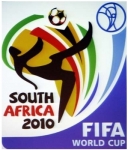23 May 2010
Will Prophet Mohammad cartoon in South Africa threaten World Cup?
 A cartoon of the Prophet Mohammad in South Africa has created a furor among the Muslim community, raising once again the debate between free expression and respect for religion
A cartoon of the Prophet Mohammad in South Africa has created a furor among the Muslim community, raising once again the debate between free expression and respect for religion
A cartoon of the Prophet Mohammad published in a South African weekly newspaper has created a furor among the local Muslim community, raising once again the debate between the competing principles of free expression and respect for religious faith in a pluralistic society.
Coming just 20 days before South Africa hosts the World Cup soccer matches, the Mohammad cartoon – which is much gentler than those published by Dutch and Danish newspapers or even by the American TV program “South Park” – has raised the spectre of a violent reaction in South Africa from extremist groups who see themselves as defenders of the Islamic faith. One alleged Al Qaeda leader, arrested in Iraq, claimed to have been planning attacks against Danish and Dutch fans because of cartoons of Mohammad printed in their countries.
The cartoon, drawn by South Africa’s premier cartoonist Jonathan Shapira – also known as Zapiro – depicts the prophet lying on a psychiatrist’s couch in heaven, complaining, “Other prophets have followers with a sense of humor!”
“He was trying to make a fairly gentle interpretation of the global debate on the representation of the Prophet and on free speech,” says Nic Dawes, editor of the Mail & Guardian weekly newspaper, which printed the cartoon.
“I have to consider the paper’s equality of treatment for different faiths,” he said. “Zapiro has profoundly offended many other people, including Catholic readers for his depiction of the pope. He’s a robust critic of Israel’s occupation of Palestine, which many Jewish readers object to. Even the president of South Africa is suing him because of his depiction, which he doesn’t like.”
South Africa's Muslim Judicial Council issued a statement condemning the cartoon on its website this weekend.
"The Muslim leadership appeals to all Muslims to express their condemnation and disapproval of this latest insult on the Muslim community in a responsible and dignified manner," the council said.
Even before the Zapiro cartoon, security at the World Cup games was already a serious concern for many foreign countries, whose citizens are likely to attend the month-long soccer tournament starting June 11. More than 325,000 foreigners are expected to attend the games, and the largest single national group of these are Americans, who have bought some 40,000 tickets alone.
Terrorist groups have made numerous threats against Danish and Dutch cartoonists who have depicted the Prophet Mohammad, and some South Africans view the latest cartoon as courting violence in the name of publicity.
Mr. Shapiro himself tells the Independent newspaper that he didn’t draw to offend Muslims but to challenge them.
“I believe that all religions should be subjected to satire and that some religious groups should not be able to think they are above society,” he said.
The US government, which will have the largest contingent of fans attending the World Cup games, aside from South Africans themselves, has not issued a statement on the Zapiro cartoon. But it does attempt to walk a cautious middle line between free speech and religious respect.
Assistant Secretary of State Phillip Crowley told reporters in Washington last week, “We are deeply concerned about any deliberate attempt to offend Muslims or members of any other religious groups. We do not condone offensive speech that can incite violence or hatred.”
Speaking about Pakistan’s ban of Facebook because of a cartoonist campaign called “Everybody Draw Mohammad Day,” Mr. Crowley added, “The best antidote to intolerance is not banning or punishing offensive speech, but rather a combination of robust legal protections against discrimination and hate crimes, and proactive government outreach to minority religious groups and the vigorous defense of both freedom of religion and expression.”
While Mr. Dawes admits that his staff has received phone calls issuing death threats, he adds that the majority of discussions he has had with Muslim clerics about this cartoon have been “extremely thoughtful” and calm.
Steven Friedman, a political scientist and director of the Democracy and Governance Program at the University of Johannesburg, says that the sensitivity of Muslims on this issue is similar to that of his own Jewish community on the issues surrounding Israel and Palestine.
As for security, Mr. Friedman says the “only way to deal with people who threaten violence is to have a decent security system in place, not to stop cartoonists from saying something.”
“This was so gentle,” he says. “It was not trying to goad Muslims. It was trying to challenge them. If a cartoonist can’t do that, then what can a cartoonist do?”
10:14 Posted in Real Islam | Permalink | Comments (0) | ![]() Facebook |
Facebook |



















The comments are closed.